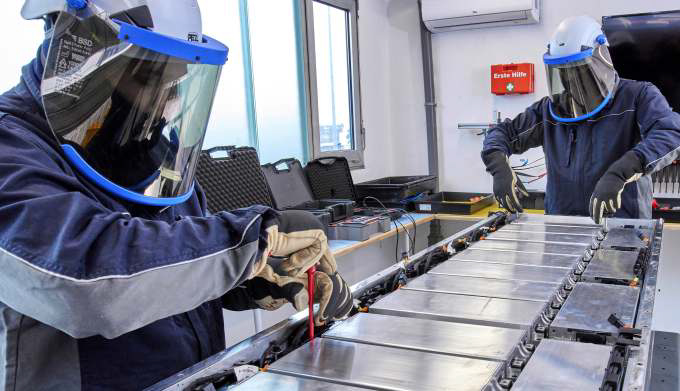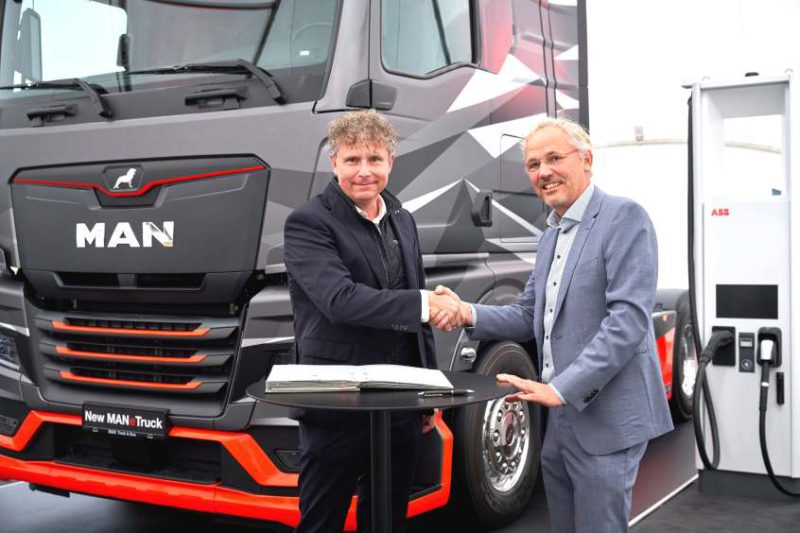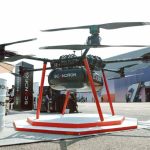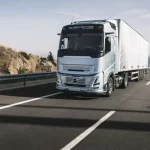Megawatt charging and more: MAN and ABB E-mobility announce R&D cooperation
MAN Truck & Bus, one of Europe’s leading commercial vehicle manufacturers and providers of transport solutions with an annual turnover of about EUR 11 billion annually, and ABB E-mobility, the global leader in electric vehicle charging solutions, signed an exclusive cooperation agreement in January. Their strategic partnership aims to work even more closely together, particularly in the area of development.
Thomas Nickels, Senior Vice President Engineering at MAN, sees the cooperation as a specialty in the market.
“Cooperation in the area of research and development is rather rare in our industry. Together with ABB E-mobility, we are striving for a trusting, binding and transparent partnership. We are already starting with the development of products and standards and are focussing on the special requirements of the commercial vehicle industry,” Nickels said.
The importance of cross-industry cooperation for the entire sector is particularly evident for megawatt charging system (MCS), Nickels continued: “At MCS, we are working with players from the entire sector to enable charging capacities in the megawatt range in the future and thus sustainable and economical long-distance heavy goods and passenger transport. By cooperating with ABB E-mobility, we can tackle the challenges of the new technology at an early stage and drive standardisation forward more quickly.”
These challenges include the ISO15118-20 communication standard and new ways of transmitting signals. The basis for megawatt charging is Ethernet communication, which is being used for the first time in electromobility. Early software and interoperability tests with vehicles and charging stations should help to establish reliable products as quickly as possible in an emerging market environment.
This is why the cooperation, which is initially scheduled to run for three years, is focussing on the customer experience right from the start, in addition to the internal development and further development of charging stations, vehicles and software.
“High charging performance, reliable technology and customer confidence – these are the prerequisites for the success of electromobility in heavy goods and long-distance passenger transport. By working together with MAN right from the early product phase, we can respond even better to the needs of our customers. By 2025, we want to bring a product to the market that meets the requirements of logistics,” said Floris van de Klashorst, Senior Vice President Products & Hardware Platforms at ABB E-mobility.
“The market needs an ecosystem that interlocks and works reliably. That’s why we want to jointly develop a concept for the interaction of MCS and CCS that addresses issues such as space, energy supply and grid expansion. MAN’s extensive expertise helps us to develop customer-oriented solutions – both for use in the depot and on the track,” says van de Klashorst, giving an outlook on future projects.
The cooperation is not just limited to logistics: “MCS will also be used in the future in the travel sector, for example for motorhomes and coaches. This will bring additional challenges and a change in user behaviour,” continued the Head of Development. SOURCE: www.mantruckandbus.com
MAN rolls out battery repair centers in Europe

In 2024 and 2025, MAN Truck & Bus will establish battery repair centres in Italy, Denmark/Norway, Austria, Belgium, Netherlands, France, Poland and UK, with further countries in Europe being planned.
Millions will be invested in these centers over the next two years. Two battery repair centers are already in operation in Germany (Hanover-Laatzen site) and Spain (Barcelona). The roll-out of the battery repair hubs in Europe is necessary because the first units of the new MAN eTruck generation will be delivered to customers in 2024.
Over 1,000 battery-electric MAN city buses and more than 2,400 all-electric MAN vans are already on Europe’s roads. With the ramp-up of MAN eTruck production, the electric vehicle population will continue to increase significantly in the coming years. The Munich-based commercial vehicle manufacturer is preparing intensively for this within its service organisation.
“Battery repair is a necessity for MAN to ensure the economic efficiency and operational readiness of our customers’ electric vehicles at a high level. We also make a major contribution to the closed-loop approach of traction batteries, as this extends the battery life in the vehicle, which conserves important resources,” said Christopher Kunstmann, Senior Vice President of Customer Service Management at MAN Truck & Bus.
The first battery repair centre and the associated build-up of expertise in the repair of batteries dates back to 2020. The first pilot repairs and process documentation were carried out for the battery of the MAN eTGE electric van, which was launched on the market in 2018.
This was followed by the battery packs of the MAN eTGM distribution truck, which was launched in a small series in 2020, and the start of series production of the MAN Lion’s City E electric city bus—also in 2020. Repair steps were trialled for all of these different batteries, employees were trained, repair instructions were created and workplace requirements were defined.
This knowledge, which was built up in the first MAN battery repair centre in Hanover-Laatzen, is now being successively transferred to the other markets. The aim is to operate a battery repair hub in every market in which MAN is represented with battery-electric commercial vehicles. Short transport routes and highly trained technicians on site will ensure that the battery can be repaired quickly. This minimises vehicle downtime.
At MAN, a battery repair center has to meet certain criteria based on practical experience and legal standards in the respective countries. On the one hand, the appropriate high-voltage and special tools are required for handling the respective battery types of the vehicles. In addition, special protective equipment must be available for the electricians working there. The premises also fulfil certain requirements, e.g. access control, double doors, air conditioning, ventilation concept, 400 V socket and load crane.














